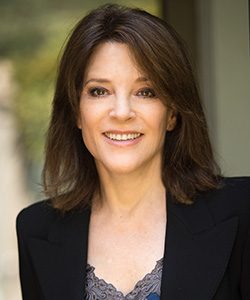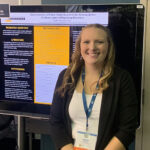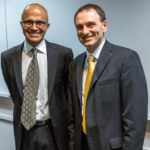What does it mean to create change in American society during a moment unique within our national history for both its political upheavals and stunning possibilities?
The Helen Bader School of Social Welfare will explore these questions during Tuesday night’s “Leading Change: Women, Politics, Advocacy, & Social Justice” event, from 5:30 to 8 p.m. in the UWM Union Ballroom. A limited number of seats are available on a first-come, first-served basis, and doors open at 5 p.m.

Keynote speaker Marianne Williamson is a seven-time New York Times bestseller and a go-to guest on the topics of spirituality, empowerment and change-making for some of America’s top television personalities, including Oprah Winfrey, Larry King and Bill Maher.
Just a few hours before she picked up her mic to talk to a UWM audience about her yearlong “Love America” tour, Williamson previewed her keynote talk and offered her take on how women can use their voices and the responsibilities of democracy to advocate for change in politics and society.
Why are you bringing the “Love America” tour to colleges and universities like UWM?
Colleges and universities are the places where we are asking the deepest questions. Whether we are in college or not, we need to be focusing our effort on a deeper understanding of how exactly we got to where we are in order to navigate more effectively the moment we are in.
Your writing on political engagement, social justice and spirituality mentions “extraordinary moments” in American history like the abolitionist movement, women’s suffrage and the civil rights era. What do you call the moment we are living in right now?
A moment of both peril and possibility. On one hand, some of our democratic principles and institutions are literally under attack. And they are under attack from forces within our country and government in ways that are very sobering to witness. But at the same time, this has awakened millions of people. Many of whom had heretofore been very distracted and are distracted no longer.
We live in a moment of stunning possibility if only we devote ourselves and commit ourselves fully. This is a historical aberration. At least I pray that it is. It’s very important that we are different people on the other side of this and then there will be no more taking democracy for granted or distracting ourselves with unimportant things. Democracy brings rights and responsibilities, and our primary responsibilities are moral, intellectual and political engagement.
What will you tell your UWM audience about how they can take up these responsibilities and engage more fully in this moment of ‘stunning possibility?’
I’ll be talking about the history of the United States and where we are within the larger historical narrative for our nation as well as for us as individuals because a deeper understanding of where you have been illuminates the path forward. I’ll be talking about the psychology of activism and talking about what it really means to discuss the end of patriarchy as more than just a slogan. And, I will be talking about a collaborative matrix of invisible alliances that brings people together at such times as these.
Can you describe in more detail the idea that there are invisible alliances around us and among us?
Throughout history there have been – and are now – genius clusters. The founding of the United States, women’s suffrage movement, civil rights movement, the antiwar movement – when people join in an effort than no individual could by themselves achieve. It is the joining, the collective intention, that provides the trust necessary for great social justice movements.
Now, that collective intention works the other way as well. Nazis and white supremacists and authoritarian groups grow through people coming together through common intention. So much collective energy has been placed in service of fear that it’s very important we place our collective energy in service of love.
I’m interested in your idea of an “outdated worldview,” something you write about in the context of the “Love America” tour. What are some of the outdated beliefs you think women are holding on to, and how they hold women back?
The most fundamental outdated belief is separation – a belief that what I do to you doesn’t necessarily affect what will happen to me. With that belief in separation comes the idea that some of us are better and some of are worse, some of us are deserving and some of us are not.
The second core error of an outdated world view is patriarchal prejudice, a way of seeing the world that leaves out essential female voices and feminine qualities.
It’s a particularly inadequate worldview today because it does not recognize the critical significance of the early childhood period. Women have always been more apt to recognize the significance of this developmental period – it’s now sociologically verified fact – that most everything that Is formative in life occurs within first our first eight years. We need a massive realignment of national resources toward providing every educational, medical and cultural opportunity possible for every child in this country under the age of 8. If and when we do that, we will initiate a change over the next 10-15 years that we can hardly imagine now.
What would you say to folks who think that your talk is geared toward listeners at a particular end of the political spectrum?
It’s not my business to determine who listens to me. It’s only my business to listen to what song is alive in me. Women get into trouble when we try to twist ourselves into some form that we think will be more pleasing to someone else, and that includes our words. I believe in Republican Dwight D. Eisenhower when he said the American mind is at its best when it is both liberal and conservative. There are high minded conservative and liberal values that at their best form a yin and yang, a thesis and antithesis, that lead to a higher synthesis for everyone.
The main dichotomy now is not between liberal and conservative. It’s between basic democracy and an authoritarian tendency that has now been given some political heft. Conservatives and liberals are concerned about this.
What suggestions do you have for your audience tonight, and your broader audience, about how women can unlock their voices and use them to create change?
I talk about how, for American women, most chains that hold us back are internal. Many of us have internalized the idea that we will only be loved we if we can find some way to “go along.” We ourselves have to unlock those chains that bind us, each and every one of us, through the power that is within us.






